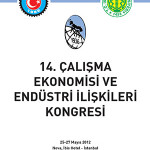
What is Türkiye’s Position in Decent Work Index? Even Others Steady At 1995.
Decent work is a concept which excessively noticed by ILO since 1998. Employment became scarce meta during the nineties. During this period, informalization process forge ahead and getting job couldn’t be enough for life well. Also if you cannot get the decent work opportunities, this means that probably your possibility to get through the occupational accident is high, your dream for retirement is so dark and the most likely you are not sure that you are going to work for your employer tomorrow. Because of these developments, decent work concept come up to ILO’s agenda frequently and people began to think too much about decent work.
Decent work has some components and also indicators. According to these indicators, academicians started to prepare an index and compare the countries up to the decent works that they have. Comparing countries is probably the most liked thing in the academician’s world. Afoot index for comparing the OECD countries in decent work performance has basic methodology. This index prepared by Dharam GHAI in the article “Decent Work: Concept and Indicators” which published in International Labour Review Vol: 42, No: 2, 2003. In that index, for comparing countries at decent work performance, explaining the four components of decent work nine ratios pre owned. According to these ratios we can give countries score and then categorize them. At four components every country has a rating and then average of this four rating they have final score and ranking. First country in this index has too much job in decent work concept, the last one has least.
In that very simple index nine ratios were used. This can clarify the gender disparities, employment, social dialog and social protection. These ratios cannot explain every concept well but they can give idea. Of course it is open to use different weighs for different indicators and for different components of decent work. What we are going to do is put Türkiye somewhere in this index. There is a big problem about comparison, other countries statistics concerning 1995 but Türkiye’s statistics refer July 2013. This means Türkiye’s position for now can comparable for 22 OECD countries position at 1995.
For putting Türkiye somewhere in gender raking, female labor force participation rate, the ratio of female/male unemployment rate and female proportion of professional, technical and administrative work is needed. According to TUIK stats, female labor force participation rate in Türkiye is 31,6. This is the worst ratio in 22 OECD countries. Put the Türkiye at the end of list. Female administrative and managerial worker ratio is 15,3 and female professional and technical worker ratio is 36,1. Average of these two is 25,7 and this ratio perform Türkiye at 20th position. Female unemployment rate / male unemployment rate ratio is 1,36 this perform Türkiye at 15th row. Overall ranking at gender for Türkiye is 21.
At employment component three indicators are used. Labor force participation rate, unemployment rate and Gini coefficient. In this component Türkiye’s overall ranking is 22. Labor force participation rate is very low in Türkiye, because of female labor force participation rate is too low. Also income distribution performance of Turkish economy is not good enough. Totally Türkiye’s ranking is the worst one after Ireland in this component.
Türkiye is the stingiest country in the 22 OECD countries about government expenditure at pensions and health according to 2009 statistics. Only 5,8 percentage of GDP spent for pensions, and 5,4 percentage for health. Total 11,2 of GDP spent for pensions and health. Finally union membership as proportion of employees rate for Türkiye is 8,8. Which is the lowest in 22 OECD countries. So Türkiye’s score in this component is the 23. Total score for Türkiye is 22,25 which perform Türkiye at the last row.
Table: 1 Country Performance At Decent Work Components And Total Score
|
Country
|
Gender Ranking
|
Employment
Ranking
|
Social Dialog
Ranking
|
Social Protection
Ranking
|
Overall
Ranking
|
|
Sweden
|
3
|
1
|
1
|
1
|
1
|
|
Denmark
|
10
|
2
|
2
|
2
|
2
|
|
Norway
|
1
|
3
|
6
|
4
|
3
|
|
Finland
|
2
|
10
|
3
|
3
|
4
|
|
Austria
|
12
|
5
|
9
|
9
|
5
|
|
Germany
|
11
|
9
|
5
|
13
|
6
|
|
Canada
|
6
|
8
|
19
|
10
|
7
|
|
Belgium
|
14
|
16
|
7
|
5
|
8
|
|
United Kingdom
|
5
|
15
|
13
|
12
|
9
|
|
Luxemburg
|
23
|
7
|
11
|
8
|
10
|
|
Switzerland
|
14
|
5
|
10
|
19
|
11
|
|
Netherlands
|
18
|
13
|
8
|
14
|
12
|
|
Portugal
|
9
|
12
|
17
|
14
|
13
|
|
Australia
|
8
|
14
|
21
|
11
|
14
|
|
Italy
|
20
|
18
|
12
|
7
|
15
|
|
Japan
|
14
|
3
|
22
|
18
|
15
|
|
New Zealand
|
7
|
17
|
16
|
16
|
15
|
|
United States
|
3
|
11
|
20
|
21
|
15
|
|
Ireland
|
13
|
23
|
18
|
6
|
19
|
|
France
|
18
|
19
|
4
|
22
|
20
|
|
Greece
|
22
|
20
|
14
|
16
|
21
|
|
Spain
|
17
|
21
|
15
|
20
|
22
|
|
Türkiye
|
21
|
22
|
23
|
23
|
23
|
Source: Türkiye’s Statistics Forum TUIK, www.tuik.gov.tr, Other Countries From The Article “Decent Work: Concept and Indicators”, International Labour Review Vol: 42, No: 2, 2003.
Sweden is the country which has the best performance about decent work. Also the other Nordic countries fallow Sweden. Scandinavian welfare regime has showed their characteristic properties. Which is not very surprised. Conservative welfare regime countries Austria, Germany has good performance about decent work. United States who has liberal welfare regime has still the de-regulated labor market and social protection and social dialog mechanism still cannot develop well. Greece, Spain and Türkiye which are sharing the last rows have big problem in their labor market. Probably Türkiye’s situation is better than these countries now. But this does not mean that we did everything about decent work concept and being on the top of Spain doesn’t mean a perfect position.
This comparison is not the whole picture about decent work. And also cannot give the same periods score for all countries. Since 1995 in the euro region most of the employment opportunities disappear and income distribution went bad. Even at the same period Türkiye did well specifically about the unregistered employment. But we can easily say that during this period Türkiye’s position at that index upraised only one or two row up. No more than this.


